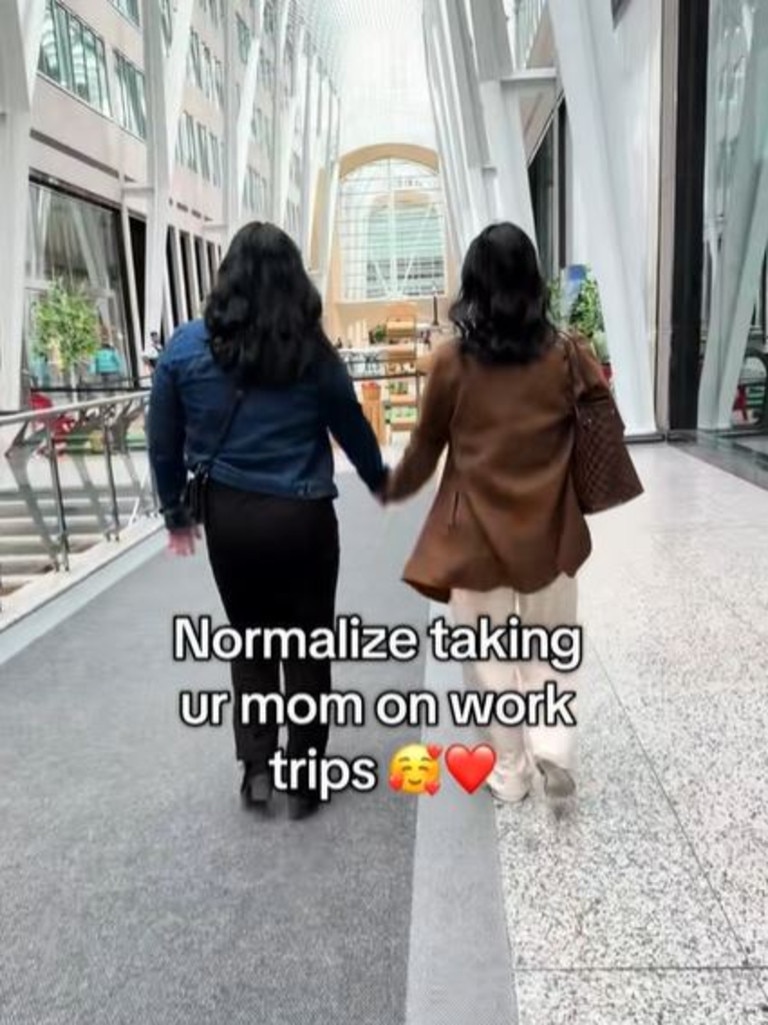New Gen Z work trip trend that would make Boomer’s heads explode
Gen Zers are doing something behind their bosses’ backs while travelling for work, but experts warn this new trend is pushing the limits of work-life balance.
Since Gen Zers started entering the workforce we have seen a rise of a multitude of different work trends, all focused around not letting work take over your life.
It started with quiet quitting and bare minimum Mondays, before moving onto coffee badging and acting your wage.
Now, the youngest working generation are taking things a step further. Rather than just focusing on work-life balance, they are now looking for ways their work can benefit them during their personal time.
They are capitalising on perks like fully paid work trips by having their partner, a friend or even a family member tag along.
It seems the younger generations have less reservations about mixing business and leisure, with the new trend fittingly dubbed “bleisure” or “blended travel”.
And they aren’t shy about sharing it either, with a rise in young people sharing their bleisure travel online.


MORE: 5 hidden perks better than a pay rise
“POV you take your bestie on all your work trips,” one TikToker wrote on a video.
“You hire me, you hire her.”
Another showed a clip of her and her mum walking hand-in-hand, writing “Normalise taking your mum on work trips.”
Another video read: “When your bf brings you on a work trip to NYC but he has to work all day while you enjoy the fancy hotel and explore the city.”
While having a plus one tag along on a work trip isn’t inherently problematic, it is the way some people are going about it that is causing controversy.


A YouGov survey of 12,000 people commissioned by the Crowne Plaza hotel chain revealed that 74 per cent of employees would invite a family member or friend on a work trip, according to Business Insider.
Shockingly, one in five admitted they had already done so and didn’t tell their employer.
It is the secrecy aspect that is the real issue with this new trend, according to recruitment specialist and author of Earning Power, Roxanne Calder.
“It’s not the act of bringing someone that signals immaturity; it’s doing it without transparency,” she told news.com.au.
“If your job funds the hotel room, there’s a basic social contract in place.”
Ms Calder said breaching this contract raises ethical questions and is not a good look professionally.
“Not telling your boss isn’t clever; it’s a failure to understand the power of trust in professional environments. And maybe the fact it is conducted in secrecy signals you might also sense it might boarder on being unprofessional,” she said.
The act of bringing a plus one on a work trip isn’t a new thing in and of itself, with Ms Calder saying what’s new is the “lack of shame about it”.
Previous generations may have still done it, but it was done quietly and possibly with some guilt or awareness that they were bending the rules.
“Only in a generation raised to believe that every moment of their lives deserves to be shared, and preferably reimbursed, would this be considered a trend,” Ms Calder said.
“That shift isn’t just cultural, it’s psychological. Gen Z is the first generation raised to optimise experience as much as achievement.
“They don’t view a career as a ladder, but as a landscape. And in that landscape, if you’re travelling for work, why shouldn’t joy come too?”

HR specialist and founder of Corporate Dojo, Karen Gately, agreed that there has been a definite shift, with young professionals being more open about blending work and personal life.
While the behaviour itself isn’t unique to any generation, Gen Z are more comfortable challenging traditional boundaries.
However, Ms Gately warned sneaking your bestie onto a work trip isn’t without its risks, saying it could very easily lead to a breach of trust between you and your boss.
“If your employer finds out you’ve concealed this, it can damage your professional reputation and relationship with your boss,” she told news.com.au.
A plus one could also prove to be a distraction from the main reason for the trip, which is to work.
“Even unintentionally, splitting your focus between work and personal time can impact your effectiveness,” she said.
“If you’re disciplined enough to be focused on work when you’re meant to be working, it can be OK. But if having your partner or friend with you is likely to distract you from achieving the outcomes you need to, it’s not a good idea.”

There are also insurance implications that need to be considered, with Ms Gately pointing out if your travel companion is injured or causes an issue it could complicate liability and insurance coverage.
While for many, this trend may just be seen as a fun way of getting the most of your work life, Ms Calder said it also speaks to something larger.
While the rise of hybrid and remote work has allowed employees previously unheard of flexibility, it also means workers are now more accessible than ever.
Most people have access to work emails on their phones, making it easy to slip into the habit of responding out of hours.
Is there a small 10 minute task that needs to be done over the weekend? Well you might as well log on at home and get it out of the way.
Ms Calder said it is this type of overlap into people’s personal lives that is driving young people to ask: “If work shows up in my personal life uninvited, can my personal life show up in my work life by design?”
“Employers who treat this purely as a compliance issue will miss the point. And employees who treat it as a loophole to exploit miss the longer game: trust, maturity, and self-awareness will always outperform hustle masked as rebellion,” she said.
In the end, the recruitment expert said it is not about whether we should ban or endorse blended travel.
“It is about having an honest conversation about boundaries, trust, and what professionalism means in a world where the personal and professional are increasingly entangled,” she said.






